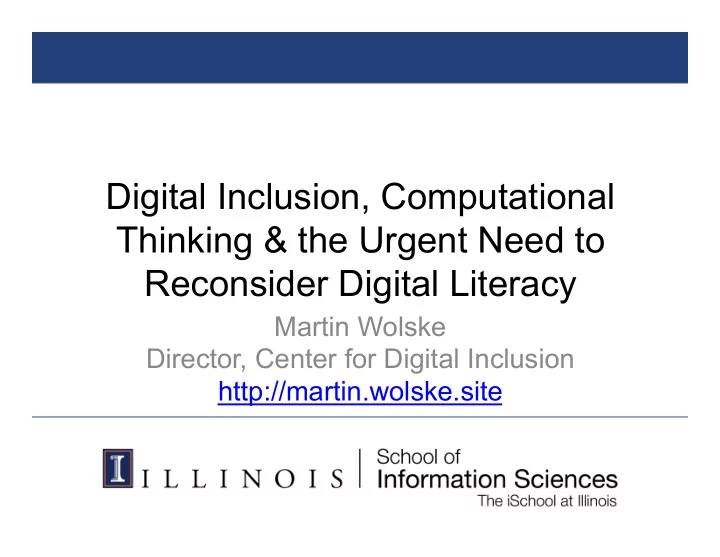

Digital Inclusion, Computational Thinking & the Urgent Need to Reconsider Digital Literacy Martin Wolske Director, Center for Digital Inclusion http://martin.wolske.site
Warmup 1. How are digital technologies like Chromebooks transforming education? 2. How would the classroom change if every student in your school had a laptop & the digital literacy skills to effectively use them? 3. If you magically had 5 more hours a week & a personal tech coach, how might you use digital technology to address a pressing educational challenge?
It is not the answer that enlightens, but the question. Eugène Ionesco
Collaborative Discussion Framework • Developed at Kenwood Elementary School, Champaign, by Todd Lash and Minsoo Park. • 5 Steps 1. What are you trying to do? 2. What have you tried already? 3. What else do you think you can try? 4. What would happen if? 5. Celebrate and share!
The Urbana Free Library Teen Open Lab
Naomi
The Call We must rapidly begin the shift from a "thing- oriented" society to a "person-oriented" society. When machines and computers, profit motives and property rights are considered more important than people, the giant triplets of racism, materialism, and militarism are incapable of being conquered. Rev. Dr. Martin Luther King, Jr. (1967) “Beyond Vietnam”
Consider for a moment some questions that are "obviously" absurd. Does wood produce good houses? If I built a house out of wood and it fell down, would this show that wood does not produce good houses? Do hammers and saws produce good furniture? … Everyone realizes that it is carpenters who use wood, hammers and saws to produce houses and furniture, and the quality of the product depends on the quality of their work. Seymour Papert, 1987 “Computer Criticism vs. Technocentric Thinking”
Technology only magnifies human intent and capacity. It can’t substitute for them. Kentaro Toyama, 2015 Geek Heresy
Digital Inclusion h(p://digitalinclusionalliance.org/defini8ons/ • Digital Inclusion is the activities necessary to ensure that all individuals and communities , including the most disadvantaged, have access to and use of Information and Communication Technologies (ICTs). Digital Inclusion must evolve as technology advances and recognizes that access to and use of ICTs are an essential element for participation in our society, democracy and economy.
Digital Equity • Digital Equity is the ultimate outcome of full digital inclusion, with focused action and investments to eliminate historic, systemic and structural barriers that perpetuate disadvantaged individuals and communities. Digital equity recognizes our moral obligation to harness ICTs to address the needs of disadvantaged individuals, as well as community or neighborhoods, community- based organizations and small businesses.
Reshma Saujani: Teach girls bravery, not perfection (excerpt)
Digital [Computational Thinking] Literacy Application skills – the ability to select, modify, and effectively use technologies to make the hard work of our professional, personal, and civic interests and responsibilities more effective. Socio-emotional skills – the ability to communicate and collaborate with others, along with the personal confidence, persistence, and tolerance, in order to tackle complex, ambiguous, and open-ended problems; Cognitive skills – the ability to logically analyze and organize problems in ways that allow use of available tools and resources to help solve them, as well as the ability to generalize new processes to other problems; and Information skills – the ability to seek, evaluate, interpret and apply relevant and trustworthy information across multiple media. Technical skills – the ability to appropriately select and effectively use a range of technologies to amplify our efforts.
Project Portfolio
The central problem of an education based on experience is to select the kind of present experiences that live fruitfully and creatively in subsequent experiences. John Dewey, 1938 Experience and Education
Not Yet
Collaborative Discussion Framework • Developed at Kenwood Elementary School by Todd Lash and Minsoo Park. • 5 Steps 1. What are you trying to do? 2. What have you tried already? 3. What else do you think you can try? 4. What would happen if? 5. Celebrate and share!
Critical Reflection
We must rapidly begin the shift from a "thing- oriented" society to a "person-oriented" society. When machines and computers, profit motives and property rights are considered more important than people, the giant triplets of racism, materialism, and militarism are incapable of being conquered. Rev. Dr. Martin Luther King, Jr. (1967) “Beyond Vietnam”
Thank You! I’d love to hear from you: • mwolske@illinois.edu • @MartinBWolske • http://martin.wolske.site Center and Related Project Sites: • http://cdi.ischool.illinois.edu • http://dl4all.illinois.edu • http://dilp.lis.illinois.edu
Recommend
More recommend